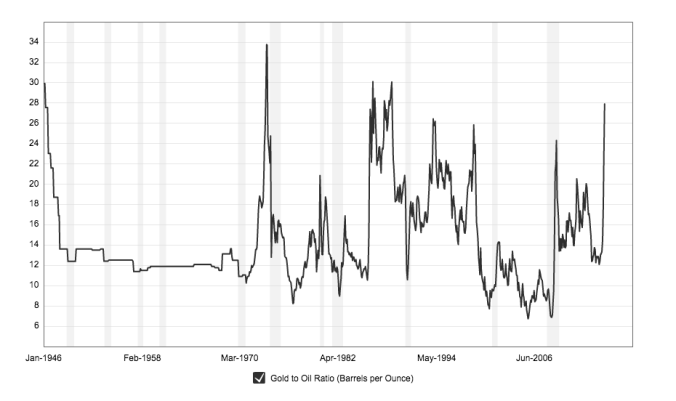You can buy twenty eight barrels of oil with an ounce of gold today. Thus sprach the market.
Here’s the gold-oil ratio since 1946. The market’s such a waffler, it should think before it spraches.
 [ Source ]
[ Source ]
You can buy twenty eight barrels of oil with an ounce of gold today. Thus sprach the market.
Here’s the gold-oil ratio since 1946. The market’s such a waffler, it should think before it spraches.
 [ Source ]
[ Source ]
What do we know about the human brain? Add this to the list: the rubbery, embalmed specimen we know and love is a mightily misleading one. It’s almost fossilized by comparison.
Suzanne Stensaas, Ph.D., Professor of Neurobiology and Anatomy at the University of Utah School of Medicine, demonstrates just how tender and vulnerable the thinking organ really is.
My favorite anatomical term in this entire video is “interpeduncular cistern.” A close second is “cerebral peduncle.”
//by Ryan Taylor//
I downloaded the app “Yo” over the weekend, wondering what all the fuss was about. For those of you not in the Yo-know, Yo is a program that allows its users to…well, it doesn’t allow users to do much beside reduce all communications to an electronic caveman grunt in the mode of Jesse Pinkman.
In other words, people can send push notifications to one another displaying the eponymous “Yo”. Another key feature is the creepy voice that utters the word.
To make the obvious Breaking Bad joke: I assume a hidden Easter egg button will transform the app into Yo Bitch!
Released on April Fool’s Day of this year, the app was initially considered a joke by the public. Yo, however, recently attracted $1.5 million in venture capital, sending the message that the app is no laughing matter. If it’s not an elaborate ruse, then what is the draw of Yo? For starters: Yo users can send Yos to any of their friends who have the app.
Okay. What else?
Well…well that’s it.
Did I mention that the app is now valued at over $5 million?
(I’m as puzzled as you are.)
So I decided to take “Yo” for a spin. I downloaded the app (for free), and in seconds I was ready to Yo.
Too much?
Anyway, when you open the app it first asks you to “sign-up.” After figuring out a tastefully offensive username and a numeric password, “Yo” introduces him(her?)self.
After ‘tapping here’, Yo offers some justifications for its own existence (more on such things later).
Or you could just say good morning, like a normal human being. But where’s the fun in that? Maybe it is true what John Lennon sang:
Yo is real, real is Yo
Yo is feeling, feeling Yo
Yo is wanting, to be Yo’d.
And fear not, lest you thought sexting would remain a chore:
 Brian Sonia Wallace, a multi-talented young artist and esteemed writer here at Screenslaver, is performing a month-long performance art experiment. He performs RENT POET, who makes his living through poetic labor alone. For one month.
Brian Sonia Wallace, a multi-talented young artist and esteemed writer here at Screenslaver, is performing a month-long performance art experiment. He performs RENT POET, who makes his living through poetic labor alone. For one month.
He is good at this stuff. Really good. Sometimes he sets up poetry “stores”––a typewriter on a TV tray, serving up hot poems on demand to passersby ––and other times, he performs spoken word poetry in all kinds of venues and on all kinds of topics.
Now, MAKE IT AS AN ARTIST IN LOS ANGELES!!! is a warranty made by not even your daftest get-rich-from-the-sofa scheme. Of course, a horny Hollywood “producer” might accost a Midwestern peach in such a way, but truth-in-pussy-hounding is a bigger joke than Truth In Advertising. But Brian’s mission is to accomplish exactly this, and by his poetic prowess alone (and some social media skills too).
You can sponsor his poetry like one might sponsor a runner in a fundraiser, just per poem rather than per mile (or kilometer, whatever, you Euro-fetishist).
You can impress your friends by hiring him to perform at your event, perhaps as a meandering minstrel or bodacious bard. A magician of words, Brian is.
You can order poems personally created for you or loved ones. This is the movie Her but like, real, and I can think of a million reasons why you’d want a poem written by a professional poet. Beside the obvious one of having a poem written for you, which would be nice. Send a get-well serenade to your cousin who had a serious bike accident. Close the deal with that girl (or guy!) who’s smarter than you and you’re in desperate need of your own personal Cyrano de Bergerac.
Find more info at http://briansoniawallace.weebly.com/ and support him and his art and art in general at http://www.patreon.com/rentpoet.
//by Keith Warren//
I haven’t really seen myself since New Year’s Day, twenty-thirteen.
I’ve been in love with a different mirror since then.
Sure I looked in my bathroom mirror in that time, but only ever with the vainest intentions. Beholden, in a culture of images, to the images of cultures arranged in pixels on the screens.
One held in hand, one in the next room. Another in earshot.
Anxious concern of how will I be perceived?
Situation A… Situation B… Situation C…
Not much concern for the future and more a concern for some other place, but that’s not here.
Some other place ISN’T. HERE.
I guess you might say it’s just the landscape, now, but that’s still so vague because what it is is all the tools we, the animal, are wielding while inhabiting space in our fields of being.
The tech is now an ever-present plasma display screen, mainlined into our psychical heads-up display. Big stuck pixels swiss cheesing mental faculties.
It’s somehow, now, pushing toward total saturation. The external world crashing in on us. A solid white tsunami noise wall of data. All the wall space is getting colonized by the empire of the screen.
I mean that both metaphorically and physically, by which I mean of course mental walls and walls as in brick walls. Walls of city buses painted with HBO shows and sexy new night club nights, because night clubs rent out space between time walls too. Medium-rise buildings rent entire facades to toilet paper campaigns, do Charmin bears shit on cinderblocks? Seemingly yes.
Inside a loud world, clamp hands over ears. Shield the searing brightness, clamp them over eyes and isolate, inward.
Don’t think of true self, persistent self. Think instead of instances of personae, slides or stills, that flash across mind’s eye.
Overestimate how much better are some times, underestimate other times. Would so much rather be doing [other thing] right now(!), also sprach the novelty license plate frame.
Then feel defeat because here and now isn’t there and now. Somewhere else isn’t here.
Imagine the alternative and picture life otherwise. Keep the journey to or from that point outside the frame. Reduce it out of the equation entirely. The hypothetically simultaneous ‘other’ self is far more exciting––the mysterious other path but implied.
A separate simultaneous world disappoints by design. We cannot possibly achieve it. We cannot be both here and there, and now.
But still I only looked at myself vainly, jealous of other instances of myself. And never once, it doesn’t feel like, did I stare down the barrel of my own life, straight into my own eyes. I saw gaunt eyes in an otherwise healthy face. I see that I’ve changed my posture for the stronger; my whole attitude and energy more natural. Fluid. But not advancing.
Sometimes you trick yourself into having someone else look at you so you don’t have to. You can see it all already anyway.
//by Leon Phany//
Ferguson is proximately close to my home. It’s a short drive up 55 until it becomes 70. Right before you hit the airport, you exit and then you’re suddenly in what newspeoples seem to believe resembles the Arromarches at D-Day.
I haven’t been up there lately. Maybe I’ll swing by on the way home. Here, twenty minutes away if I drive slow, we still shop at the supermarket. Drive around. Life proceeds as usual.
I was down at the protest rally today in Clayton. I arrived as it was ending, and everyone dispersed quickly. It was only about twelve people by this time. It was located at a short stretch of road that had been blocked off with five foot orange barriers. Last time they had planned the rally––one set for eleven and attended by a whole two hundred––the police and officials had overestimated and also set aside the parking lot for the assembly. So much space wasn’t needed, like Tyrion Lannister in a California King.
The last reporter there was a French reporter. He spoke to a camera with nobody behind him. He stood between the camera and windows of the Justice Center. Behind those windows sat a few police officers who really needed popcorn, sitting in those chairs that you find in a church gymnasium and arranged like a movie or play was about to begin. But with riot shields in front of them.
Apparently, they had had more to do earlier.
An individual had––according to different clerks and witnesses––made the mistake of expressing her support for police officers. She began a heated exchange with the crowd that I guess had been there at some point, and then she was escorted out by officers.
Now, I am most disappointed by the fact that Ferguson is a small town. It has this ordinance, 8.1.3, which allows for a referendum to recall any appointed or elected council member or elected mayor by a city election. Only five qualified voters need begin the process. A recall of the city council members who had a hand in the selection of this white police officer would be a simple solution.
Obviously, not the entire answer. But maybe a useful step in the right direction.
But that don’t make for good news.
//by Ryan Taylor//
TL;DR: Twitter destroys the integrity of discourse and reinforces cheap appeals to ideology.
Although what’s going on in Ferguson right now is incredibly problematic––not to mention: despicable (also: alarming, infuriating, insulting)––the social media explosion that preceded (and which continues to comment on) the Michael Brown case is symptomatic of another problem, that is: the dramatic lowering of the bar for what constitutes legitimate political discourse.
Our soundbite news culture, exacerbated by Twitter’s 140-character format, has been disturbingly successful in its ongoing replacement of more traditional modes of dialogue. Modes of dialogue which, not viral in any sense of the word, share as a foundation a rigorous analysis.
Before critically examining any of the evidence in the Mike Brown case, I admit I was ready to condemn the police (and all police) in much the same way the Twittersphere and my own Facebook News Feed™ has done. Based on my own political lean, I consumed and dispersed a narrative that appealed to me despite a lack of substantiated evidence therein.
After taking some time to read up and think about the case, my perception of the incident has completely changed.
What’s problematic is not the quickness with which my opinion was able to change, but the quickness with which it was first formed.
Ideology led me to conclude that the Michael Brown case was just another example of institutionalized racism and fetishized violence coming to a head, á la George Zimmerman. Twitter confirmed my conclusion, muddling and mincing the facts.
While the actions Officer Wilson took are inexcusable, even idiotic, the way he has been represented in this case as a ‘cold blooded killer’ is probably disingenuous. Trigger-happy yokel? Yeah. Racist? Very likely. Cold blooded killer? I don’t know the man that well.
To the point: ideology will always play a role in human judgments––this much is certain––but that doesn’t mean we should not be critical of ideology and the mediums through which it influences us.
Now, this post is incredibly ironic, given that its thesis concerns the impotence of social media platforms (like the one I’m using right now) to be politically productive or rigorously composed. This post is certainly neither. But that doesn’t preclude me from pointing to a growing problem: the disavowal of reasoned argument in favor of the easy-to-consume rhetoric of social media.
I drink to forget the news.